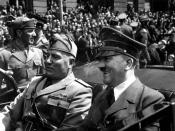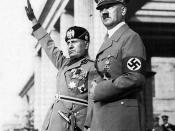American Isolationism
Throughout the 1920's and the 1930's America retained the role of an isolationist country. The goal was a universal idea of maintaining peace around the world. However, it turned out to be an extremely difficult task. America was also looking out for itself, not wanting to get involved in any major wars or conflicts. The United States limited the amount of immigrants, sacrificed the tradition of freedom and opportunity, and ignored attacks on American ships and civilians in order to preserve peace and remain isolated.
Immigration was severely limited in the 1920's due to the fact that some Americans believed that "a sickly Europe was indeed vomiting on America." In 1921, the Emergency Quota Act was passed, restricting European immigrants to a definite quota, which was set at three percent of the number of people from that country living in the United States in 1910. This was eventually replaced by the Immigration Act of 1924 which changed the quota to two percent, and the national-origins base was altered to 1890, rather than 1910.
This pleased American isolationist, but at the cost of sacrificing what America was best known for, a land of freedom and opportunity.
Isolationism was not always the universal philosophy during this time period. Franklin Roosevelt and his diplomacy strategy was to ensure Great Britain and the other European nations that America was behind them, and opposed to Nazi Germany and Adolf Hitler. At the same time, Roosevelt was struggling to satisfy the isolationist voters and Congressmen. After the China incident, where Japanese militarists triggered a full invasion of China, Roosevelt did not implement the neutrality legislation because it was not officially declared a war. While this reassured the isolationists, Franklin Roosevelt's "Quarantine Speech" did not receive the same reaction. The speech was feared...


